![]() As soon as videogames went beyond being these fun little things you stuck quarters into, they became the Evil of their time period. Politicians railed against the violent images depicted therein, appealing to an audience of frightened and ignorant parents. Studies were launched to find out the truth, to discover if these concerns were justified. Studies were inconclusive, as some had shown a noted increase in violence among children where others did not. Studies still continue to this day, people trying to figure out if this media actually makes people more violent. But, people who made videogames, people who played videogames, even people who had no stake in videogames rallied to the defense of this new entertainment media. Around the middle of 2000, everything seemed to even out, with the pressure on gaming having dropped.
As soon as videogames went beyond being these fun little things you stuck quarters into, they became the Evil of their time period. Politicians railed against the violent images depicted therein, appealing to an audience of frightened and ignorant parents. Studies were launched to find out the truth, to discover if these concerns were justified. Studies were inconclusive, as some had shown a noted increase in violence among children where others did not. Studies still continue to this day, people trying to figure out if this media actually makes people more violent. But, people who made videogames, people who played videogames, even people who had no stake in videogames rallied to the defense of this new entertainment media. Around the middle of 2000, everything seemed to even out, with the pressure on gaming having dropped.
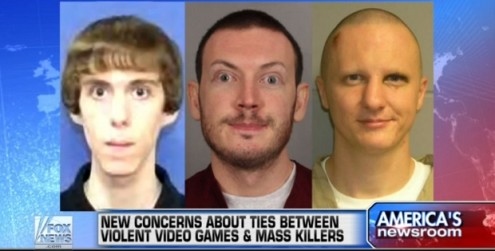 The stigma videogames have been fighting since the ’90s.
The stigma videogames have been fighting since the ’90s.
Certainly, some games still faced pressure. When the Hot Coffee scene was found to still be in Grand Theft Auto: San Andreas, there was a call about the corruption of youth. Mass Effect‘s romance options were considered demeaning to and objectifying of women. Saint’s Row: The Third was considered to be glorifying gang violence, sexism, and misogyny. However, gamers would keep standing up and saying that their chosen media does not make them violent, woman-hating monsters. They’d take “gamer” and make it a badge to wear, something to honor. Being called a “gamer” meant standing for something more, more than a nascent media platform that was still finding its legs. It became a political movement against an older generation intent on destroying something the younger generation loved.
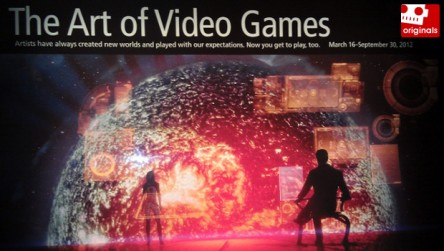 They’re a special form of art, immune to all critical consumption.
They’re a special form of art, immune to all critical consumption.
Or did it? People were claiming videogames to be higher forms of entertainment; art on the scale of movies, paintings, and novels. However, when people started criticizing the darker elements of games, like one would any other form of art, they’d be shut down. People reading into the plot of videogames were perfectly fine; however, once they started wondering if skimpy female armor designs, killing off female characters to put male characters through emotional turmoil, or flat-out not having female characters at all was wrong, gamers tried to shut them down. “Videogames are art,” they cried, “but stop looking too much into it! Sex sells; deal with it! Videogames are meant only for men anyway! It’s a male fantasy!”
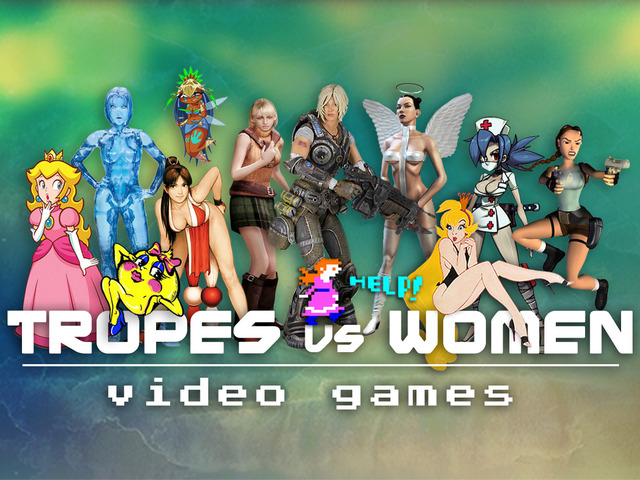 The backlash proved her point better than anything she could ever say.
The backlash proved her point better than anything she could ever say.
Perhaps the first major instance of hypocrisy in gamer culture, though, was when feminist blogger Anita Sarkeesian attempted to do a series on how tropes in videogames were hurting women in 2012. She had a similar series on how tropes in movies were hurting women, and that received little attention outside of other feminist sources. However, once she started doing her “Tropes vs Women in Video Games” series, she received huge backlash. She received threats of violence, rape, gruesome depictions of her being hurt and violated by videogame characters, even attempts to obtain her personal contact information to better harass and attack her. People calling themselves “gamers” were issuing threats of violence after decades of attempting to prove videogames did not cause people to become more violent.
 Gamers spouting violence over a game made by a woman.
Gamers spouting violence over a game made by a woman.
But maybe that’s just an isolated incident. Either way, by 2014 there was a growing movement of gamers being incredibly violent. When Zoe Quinn attempted to get her game Depression Quest approved on Steam Greenlight—for the low, low cost of free—she received death and rape threats. It strangely didn’t stop there. A huge movement to harass one woman emerged from the release of Depression Quest as a group of dedicated gamers organized a campaign of threats and violence toward Quinn and anyone who spoke in favor of her. Well…almost anyone. Strangely, women who spoke out against this movement received similar trouble: death and rape threats, and their personal information made publicly available—but, strangely, men did not. People who should be hard to track down, such as Felicia Day, were instantly found out. However, when men such as Chris Kluwe, Wil Wheaton, and Stephen Colbert spoke out against this new group of gamers, nothing happened to them. This marks a disturbing trend in gamers.
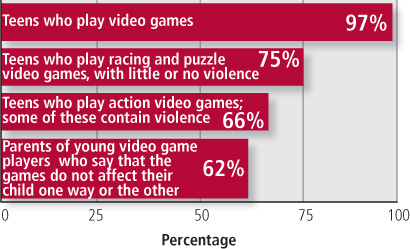 Who knows what this chart is trying to communicate? But it’s from Harvard, so you know it’s legit.
Who knows what this chart is trying to communicate? But it’s from Harvard, so you know it’s legit.
Perhaps the news outlets were right, that growing up with games that objectified women and encouraged violence would turn a generation of gamers into violent and sex-crazed monsters. Or, maybe this is just a case of causation and correlation. Whatever the case may be, the political movement around videogames has become a scene of violence in the wake of the media targeting games for causing violence in people. Is it a coincidence that 15 years ago, newscasters were asking if Grand Theft Auto would make your children violent—and now, 15 years later, those children are grown up and threatening to rape and murder women for daring to talk about and make videogames? And, where once there was a huge demand for videogames to be recognized as art and to face the criticism and respect that such a category demands, we now we have groups of people sending out threats of bodily harm to anyone who dares to criticize their favorite videogame customs? Whatever the cause of these trends, it’s clear to me one thing: Gaming as a political movement (and “gamer” as a political group) is one founded on hypocrisy and violence.

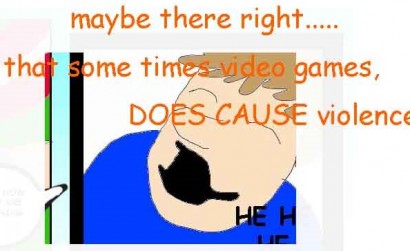
Gamergate pretty much makes me ashamed to acknowledge myself as a gamer and a member of Generation Y. It’s pretty much World War G, putting the small percentage of hyper-idiot feminists and the mind-boggingly bigotted male gamers who prove them right on opposite pedestals for everyone else to look up, confuse them for charismatic leaders, and pick sides, and turn a reasonably simple and quite right-minded discussion of “We really need to update the gender equality in gaming” into the biggest, stupidest problem the gaming community has seen in years.
I’m just appalled at what the one thing I could ever associate myself as has become. I pretty much can’t trust anything on the subject of gender issues in gaming (not even any of the shit I’ve written on it) because of it. This used to be a pretty non-biased, open and awesome culture to dive into, and in just a couple years we totally fucked it all up.
I’m a bit confused about your “hyper-idiot feminists” remark. Who are those people, exactly? And, if they popped up as a response to people who validated their arguments, why use them to create a false equivalence?
I’d wager he’s referring to the tumblr-brand “social justice warrior” feminists. Or to be more clear, the 15 year olds who don’t understand enough about the world to correctly identify and analyze social problems that Gamergate think represents the entirety of feminism… because reasons.
What Xavier said. It’s better worded and more concise that I could ever say it.
There are miles and miles of idiots in gaming, some of whom I imagine are too young to know common sense, and the misogyny of adults is even worse. As for feminists, they don’t give a @%5& about gaming. They’re only in it to ‘smash the patriarchy’. Good luck to the developers to balance these two out. In the end I think we’ll have at least one token strong girl in every game and everyone will be happy for a while. If you like games you’ll play as a damn goat after all. 😀
Because feminists can’t play games also, right? It’s not like this is a hobby I enjoy or anything, I’m just buying all these games on Steam and writing articles about them because it helps me smash the patriarchy!
Reading this was like reading a feminist propaganda piece. It’s so obviously, painfully, horribly biased, it’s hard to know where to begin. So let’s start with the obvious; the gamergate controversy. You mention this massive uprising of gamers who conspired to send Zoe Quinn rape and death threats. Funny, the push she made for that she was receiving threats was a controversy herself because it started with an account that was created THAT day, and, suspiciously, she was never on when the ‘harasser’ was, and vice versa. There are plenty of places to find screencaps with time stamps showing this curious situation. Next, you say men didn’t receive threats: which is hackneyed, false journalism. Not only did male supporters receive threats online but at home as well.
And that’s just the anti-gg side. You want to complain about the MINORITY of trolls who harassing them (and you used a screencap of 4chan, the cesspool of trolls, as your proof? HA!) but you completely failed to mention the Anti-GG parade of assholes who doxxed supporters of Gamergate. Journalists, male AND female, who supported the demand for more respectable, upstanding gaming journalism rather than the nigh-transparent bullshit that gaming journalism has become, had their information spewed across the internet, and death threats and rape threats sent to their homes and work places at all hours. What’s funny is the anti-gg movement grew out of the misguided assumption that men didn’t want women to have a representative power in games, which if you spent half a minute actually being a journalist with an agenda, you’d see wasn’t true.
And now, you’re regurgitating this propaganda, saying that ‘oh no, well, maybe vidya IS dangerous’ as if trying to lay a seed of doubt. Tell me, what about the Fine Young Capitalists, a female troupe of developers and entrepreneurs, who busted their ass raising money to develop a game, and then had it hacked by the anti-gg movement. Why were the anti-gg’s so pissed? Because /v/, the videogame board on 4CHAN, donated close to $11k to their cause. Just look up ‘Vivian James’, a character made, a FEMALE character made, that hearkens to the declaration ‘vidya games’.
Then you bring up Anita Sarkeesian, a NOTORIOUS vlogger who has 1.) stolen artwork, 2.) stolen clips, 3.) failed to back up her Kickstarter despite making goals, 4.) mislead viewers by skewing what she shows to support her argument (for example, saying Hitman intentionally makes its you have to murder strippers while the game in fact penalized you for ANY civilian deaths), and 5.) disabled her comments sections for her videos because of the massive amounts of feedback criticizing her inaccurate portrayal of the games she reviews and all the information she blatantly ignores that counters her egregious failings as a reviewer. Hell, she even states in a video that she DOESN’T LIKE GAMES. And to presume, again, that the minority of gamers who issued her threats, a percent of a percent of a percent of the gaming community represents to the position of all gamers as a whole? That’s pathetic. And what’s more, to say that the backlash she received was because she was having her point proven and not because she was a terrible reviewer and vlogger and was CONSTANTLY called out for her bullshit is pretty goddamned weak.
Gamers aren’t against women. We aren’t violent. We’re not psychos or monsters. We may be perverts (who isn’t), we may talk smack on speaker (who doesn’t), and we may be testy when people put out crap games, fish for good reviews, and then we spend our hard-earned money on those crap games based on those good reviews. But the majority of us just want fair gaming journalism and people to share our games with, REGARDLESS of gender.
If you play games, all we ask is you join us and bring your controller. But when you try and make gaming political, based on misinformation and LIES,and your journalism makes these skewed pot-shots at us, with an obvious and open biased? Then we stand up to be heard. I’m a proud gamer, and a proud Gamergater.
And you? You’re a hack and you should be ashamed.
Seems Ive found a warm place in my heart just for you this Valentine’s Day. Be mine? Please, I need your fact-based arguments and logic that’s….well, logical.
Seriously, though. Perfect rebuttal. I might have to use this later. With proper credit due, of course.
To paraphrase another writer:
Everyone who stands with GamerGate is choosing to accept help from harassers and abusers, because harassers and abusers are the source of GamerGate’s relevance and influence.
That is why I condemn all of GamerGate, its apologists and the “moderates” right along with the harassers and the abusers. That is why I blame all of GamerGate for the dark cloud that descended on gaming — and especially on women in gaming — in 2014. They have all decided to share in the rewards of hate, and so they all share in the blame.
When I started writing, it was to build a new Grand Scale RPG to compete with Final Fantasy. I wrote plainly and with issues of equality in mind. My lead protagonist was female, strong, competent, and just generally normal. She would lead a warring nation to peace and be the progenitor of the series’ later heroes. Her love interest is a simple blacksmith who would eventually be a stay at home father, and her foil would be her equal in every way, only fighting for the other side. I’ve designed the story to run for 3 generations but it’s simple enough that it could go on endlessly, and with actual continuity. RPG maker is my only road block. It’s boring if you don’t set landmarks and stopping points.